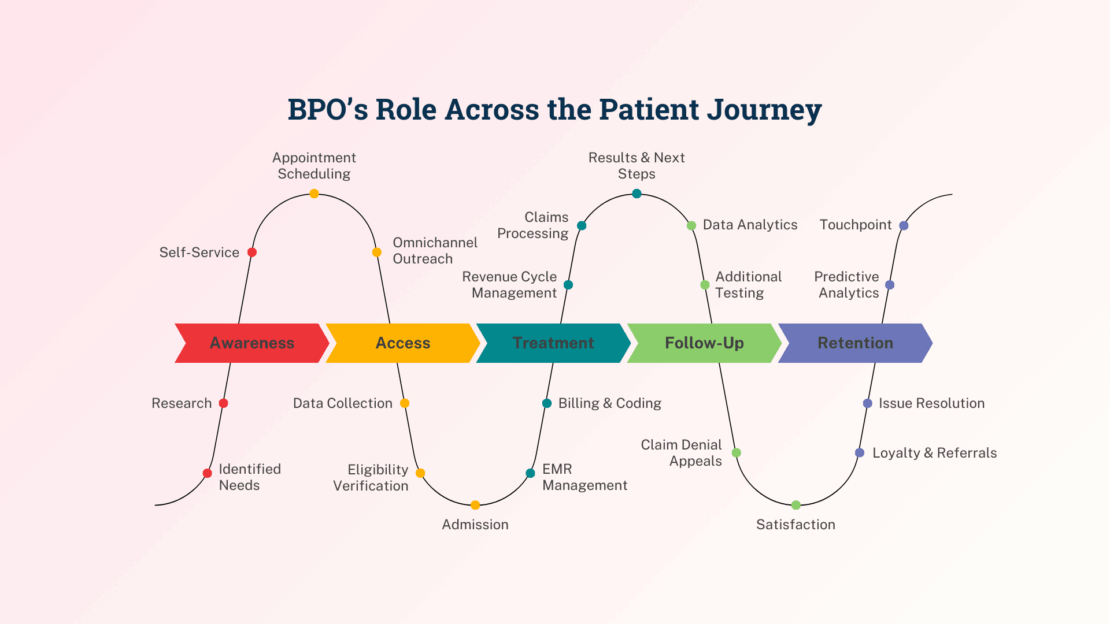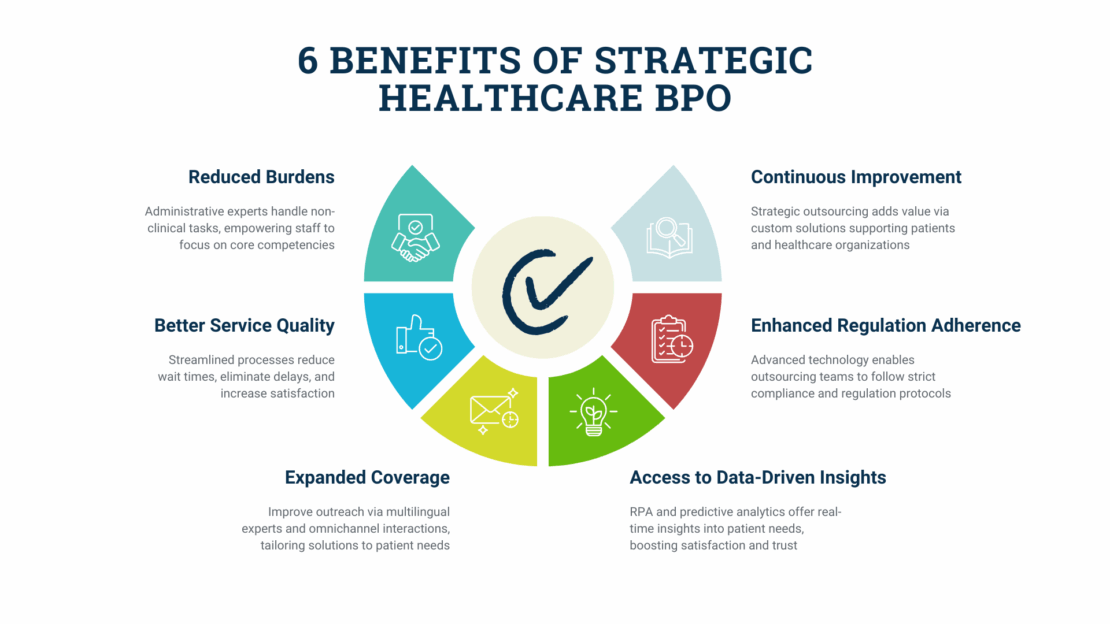Healthcare BPO enables healthcare organizations to streamline processes, reduce errors, and improve satisfaction through data-driven strategies that add value to the patient experience.
Read Time: 15 minutes
Table of Contents
Introduction
Outsourcing has transformed the healthcare industry since the worldwide Coronavirus outbreak in 2020. As companies relied on remote work, technological innovation, and the resulting streamlined processes, healthcare business process outsourcing has only grown more sophisticated, evolving from a cost-cutting solution to a strategic move to improve efficiency, compliance, and patient experience through expert support. Patient needs continue to evolve, prompting providers to utilize the advanced services of healthcare BPOs, accumulating in a projected $470 billion industry by 2026.
Healthcare outsourcing is on the rise. Whether your healthcare company has been outsourcing for years or you’re new to the game, now is the time to assess your operations to determine how outsourcing can improve your service capacity, patient satisfaction, and long-term business success. Read on for our guide to healthcare BPO best practices.
Key takeaways
- Healthcare BPO impacts more than just financially—it enables scalability, compliance, and better patient engagement for healthcare providers.
- Outsourced partners now offer HIPAA-compliant solutions that integrate with EMRs and automate workflows.
- Real-world ROI is seen in reduced billing errors, faster claims, and improved patient communication.

What is healthcare BPO—and why the definition has evolved
Understanding the nuances of modern healthcare BPO will prepare you to most effectively use the best of legacy systems and current strategies to meet your business goals.
First, learn what it is—
Healthcare BPO is the practice of outsourcing non-clinical work to third-party service providers.
—And what it is not.
Healthcare BPO is not merely a cost-cutting measure or a way to push work onto inexperienced agents. Rather, BPO experts connect organizations with HIPAA-compliant experts comfortable with handling specific requests and services and with the connections to integrate industry-leading technology into your tech stack, improving efficiency and productivity.
Next, understand why organizations do it.
Clinics and hospitals outsource time-consuming back-office functions not only to reduce costs, but also to allow internal staff to focus on their core competencies, such as patient care, while external experts handle administrative tasks.
Outsourcing is famous for being a quick way for businesses to cut costs, but while affordability continues to be a huge draw for healthcare organizations, outsourcing is its own field, constantly growing with technological innovation, agent expertise, and evolving customer needs.
From back-office support to strategic partnership
Customer service is the reactive support that agents provide to your customers. Typically, this means answering questions, complaints, and general inquiries regarding everything from billing to tracking orders to resetting passwords. Customer service is also typically issue-specific, and its quality can be measured through more tactical metrics, such as Average Handle Time (AHT), First Contact Resolution (FCR), and Customer Satisfaction (CSAT).
Defining customer experience (CX)
Even within your specific goals, excellent outsourcing uses partnership as its cornerstone. Shifting from a clinical approach to a comprehensive strategy ensures your new team can appropriately own all customer relations, helping your organization not only expand service capacity but also better understand your patients and provide proactive solutions to resolve issues.
How do BPOs achieve this? They start with a few key strategies:
- Custom collaboration. An expert BPO should have in-depth discussion of the processes you need to optimize and the struggles your patients and staff face.
- Technology integration. Your new partner should assess your current tech stack and provide recommendations for secure systems that can streamline processes and efficiently handle all operations, from omnichannel interactions to billing to Electronic Medical Records (EMR) management.
- Personalized care. Support experts know how customer expectations are evolving and how to meet them in creative, accessible, efficient ways. Whether it’s in higher service quality or enhanced self-service options, personalized service supports your staff in not only meeting the urgent needs of your patients but also in proactively anticipating and resolving them, building relationships, and enhancing the patient journey.

Common and emerging healthcare BPO services
BPO services encompass vital healthcare functionalities and additional specialty services, improving the efficiency of your organization in concrete ways.
Billing and coding: Healthcare BPO providers convert medical billing codes into billable charges for insurance purposes, enhancing reimbursement and reducing errors through skilled professionals and efficient technologies.
Claims processing: Expert agents use appropriate tools to receive, review, validate, and approve claims submitted by patients, improving the management of payments from insurance companies and patients.
EMR management: Healthcare outsourcing partners use industry-leading digital platforms to securely store, manage, and access patient health information. Expert EMR management enhances communication, streamlines clinical workflows, and allows on-site staff to focus on delivering custom in-person care.
Data analytics: Your technology integrations not only process and allow agents to securely handle all this vital information; it also transforms raw data into actionable intelligence, empowering your organization to make informed decisions to streamline service delivery and patient outcomes. Work with your BPO to use descriptive, diagnostic, predictive, and prescriptive analytics to improve and personalize your patient care.
Revenue Cycle Management (RCM): Outsourcing optimizes the patient experience while supporting the provider’s business and financial health. A prime example is outsourced RCM. Efficient, accurate management of payments enhances payment processing, ensuring the health of your company while reducing errors and dissatisfaction patients experience as you spend time and resources fixing them.
AI-driven automation: Provide the personalized service patients expect, when and where they need it, by enhancing self-service through artificial intelligence. Automations help your business efficiently scale, empowering you to serve more customers with more accurate custom solutions.
Patient support: With the above processes and additional customer support strategies such as patient scheduling and issue handling, BPOs help healthcare organizations serve more patients and reinvest in patient outcomes.
READ MORE: How Automation in BPO Is Enabling Scalable, Hyper-Personalized Customer Support
Want to scale your business?
Global Response has a long track record of success in outsourcing customer service and call center operations. See what our team can do for you!
Beyond cost-cutting: The strategic advantages of healthcare BPO
Outsourced support can improve operations and finances more than just by reducing staffing and overhead costs. It can boost efficiency and productivity, more effectively engaging your teams and your patients in common goals. As a result, your patients are more satisfied and your business thrives. Incorporate these strategies into your healthcare outsourcing plan to capture the host of advantages of healthcare BPO.
Improved Revenue Cycle Management
Enhance your end-to-end revenue cycle management through healthcare BPO that prioritizes security, efficiency, accuracy, and speed. Work with a partner to locate areas where you might be losing revenue to maximize your reimbursements and expedite the patient billing process in a way that maintains a patient-first mindset.
Optimize your RCM by focusing on these key features:
- Patient access services. Guide patients through scheduling, registration, and insurance verification.
- Patient accounting. Outsourced experts handle various financial processes, from medical billing and coding to charge capture, claims processing, and more.
- Health insurance management. Navigate the complex systems using quality software to manage claims, benefits and payer communications, and claim denials and appeals.
Patient experience as a competitive advantage
Empower your teams to deliver the high-quality level of care that sets your practice apart by outsourcing non-clinical tasks to dedicated agents experienced in your specialty. Outsourcing supports, rather than distracts from, your team and allows your business not only to grow but also to offer more tailored patient support, further setting you apart as a practice that understands and prioritizes patients.
Discover how healthcare BPO improves patient satisfaction by revolutionizing your operations and opening your business up to these results:
- Reduced administrative burdens
- Shorter wait times
- Better service quality
- Enhanced communication channels
- Expanded coverage
- Multilingual support
- Access to data-driven insights
- Enhanced regulation adherence
- Continuous improvement

Compliance and risk reduction (HIPAA, data privacy)
Many healthcare leaders may understandably hesitate to outsource vital healthcare services. Regulation compliance and data privacy are of utmost importance and should never be sacrificed for efficiency’s sake.
Thankfully, HIPAA-compliant healthcare BPO solutions align with this priority. Having worked in the industry for years, healthcare BPOs and their agents operate in a strict adherence-first mindset, complying with all regulations and securely handling patient information.
Advanced technology also supports these standards, reducing risks and enhancing accuracy through specific efforts:
- Constant interaction tracking
- Potential issue flagging
- Implementing robust quality assurance frameworks
- Maintaining rigorous compliance protocols to ensure patient trust
Reducing staffing gaps with scalable support
An ever-present challenge to healthcare organizations industry-wide, understaffing leads to real struggles that impact everyday operations and the long-term health of your patients, staff, and organization. Thankfully, outsourcing directly addresses these challenges and turns them into sustainable successes in concrete ways.
- Admin overload → Outsourced experts own administrative duties.
- Overworked employees → Outsourced support allows employees to focus on core competencies.
- High patient wait time → Omnichannel tracking, automations, enhanced self-service, and other streamlined processes reduce wait time and increase service capacity.
- Rushed work, more errors → Efficient workforce management reduces or eliminates errors and prioritizes regulation adherence.
- Clinical burnout → A scalable workforce reduces burnout and boosts employee satisfaction.
- Lowered patient satisfaction → Increased operational efficiency enhances service quality, increasing trust and raising satisfaction.
Real-world impact: How leading providers use healthcare BPO
Don’t just take our word for it. Discover how healthcare outsourcing is driving measurable impact for organizations like yours by evaluating the efforts and results in these case studies.
BPO in medical billing and claims processing
Medium reports of a large US hospital chain struggling to manage its medical billing and claims process operations. High denial rates and delays in claims reimbursements led to significant revenue loss, prompting the hospital to turn to a healthcare BPO provider specializing in medical billing and RCM.
Robust billing and coding practices, optimized claim submission processes, and analytics identified root causes of the claims denials, improving strategies and allowing the company to process claims faster and invest in additional medical services and technology upgrades. The processes enhanced patient care and led to an overall increase in revenue.
How outsourced billing services improved RCM
Flatworld Solutions helped a medical billing and consulting firm maximize their earning potential by reducing expenses and reducing claims denials by connecting the company with medical billing experts. FWS created a custom solution to improve cash flow and collection, providing specific solutions to address the root causes of errors.
Transforming CX and increasing revenue and patient outcomes for a premier healthcare system
ROI CX Solutions, a partner of Global Response, helped a non-profit healthcare organization in Montana, Wyoming, and the western Dakotas improve their scheduling and overall patient experience. ROI provided a staff of 10 full-time equivalents in 5 days to manage overwhelming call volume, implementing advanced technology to enhance the telephony system and EMR system.
The updates and centralized patient scheduling center eliminated long wait times and increased patient satisfaction, increasing the speed of answer by 99.7% and allowing the team to serve more patients than ever before and preparing the company for significant growth.
What these stories prove about strategic outsourcing
Healthcare organizations and their partners know the impact of each process on patient experience, employee health, and overall business success. Whether the issue is claims denials or staffing shortages, successful healthcare BPO can eliminate or solve the roadblocks to patient success, boosting efficiency and improving satisfaction all around.

Choosing the right healthcare BPO partner
Your outsourcing partner selection should be just as informed as anything you do in healthcare, with a strategic approach that targets your goals and aligns your values with a provider’s strengths. Follow these checklist items to ensure you select the best healthcare BPO partner for your medical practice.
- Identify your needs
- Evaluate key services
- Read case studies to determine experience
- Demo technology options and assess integration capabilities
- Assess cost-effectiveness and additional value
- Scrutinize compliance and security protocols as well as quality assurance methods
- Ask about solutions for flexible staffing and scalable solutions
Critical questions to ask before signing a contract
Ensure you get the most out of your BPO provider appointments by asking key questions. These 10 questions will ensure you get a clear picture for what to expect of a provider and accurately assess their fit for your healthcare organization:
- How long have you been a provider of healthcare BPO?
- What languages do you support?
- How do you align your culture with ours?
- What strategies would you implement to address my challenges?
- How do you measure success?
- What key performance indicators do you track, and how often? How do you improve results?
- How do you utilize technology, automation, and human support in your operations?
- How do you evaluate patient experience and satisfaction?
- How do you ensure data security?
- What is your availability and responsiveness?
Before you sign an agreement, clearly communicate your expectations for how you want to work, strategize, and manage teams with a partner. Communicate upcoming volume demand surges and specific deadlines or hiring timelines.
READ MORE: Healthcare BPO Services: Navigating Success in Healthcare Outsourcing
Red flags: What a bad BPO relationship looks like
While outsourcing is improving, some providers can’t keep up. Different approaches yield different results, so finding your fit is key. Determine the type of relationship you seek and the ones you want to stay away from.
Beware these BPO red flags:
- Weak technology – complicated integrations, little accessibility, bad user experience, buggy software
- High attrition – and resulting costs and time spent re-hiring and training
- Unclear strategies – no vision and a lack of custom solutions
- Inconsistent quality control – no direction to meeting goals or assessing performance
- Over-reliance on AI – no balance between automation and human support
Integrations and tech: Look for AI-enabled, EMR-compatible solutions
The BPO industry is rapidly changing with technology innovations and rising patient expectations. Seek a partner that not only checks the above boxes but also is technology-forward. A healthcare BPO expert should implement AI-driven automation in healthcare BPO services to power their solutions, support your teams, and enhance daily operations.
Your ideal partner should combine AI efficiency with legacy human intelligence, securely handling data with an eye on the patient journey, for a comprehensive strategy.

Future-proofing healthcare with BPO
Healthcare providers must also keep up as customer service evolves, but they don’t have to do it on their own. Healthcare outsourcing empowers your institution to adapt with the times, allowing your team to focus on their core competencies while your partner scales your support team with fluctuating needs.
A proactive partner stays on top of industry changes and proactively implements best practices to engage your customers and improve process efficiency. Outsourcing key services will ensure on-site staff can provide the human support necessary to continue building relationships that last.
The role of AI, RPA, and predictive analytics
Artificial intelligence is revolutionizing customer support, and top-quality BPO providers can leverage it for specific operational improvements in healthcare. Robotic Process Automation and predictive call center analytics are key features of automation vital to customer success.
RPA, or software robotics, uses intelligent automation to perform repetitive tasks traditionally done by human workers. Common tasks include extracting data, filling in forms, and moving files across various software systems. Scripts emulate human processes, teaching RPA tools to autonomously execute activities and transactions and significantly streamlining healthcare operations.
Predictive analytics technology tracks historical and live data, statistical algorithms, and Machine Learning to predict future outcomes. Customer service outsourcing providers rely on predictive analytics to better understand customer sentiments and behaviors, providing real-time guidance and actionable insights for improving satisfaction.
BPO’s growing role in population health and value-based care models
Saving lives takes a village, and BPOs are proving to be a key tenet to patient and provider support in substantial ways:
- Technology connections enhance security and efficiency.
- Customer experience expertise ensures end-to-end customer success.
- BPO providers are increasingly focusing on adding value to customer experiences through custom solutions, customer feedback, and predictive analytics.
- Scalable support encourages retention, satisfaction, and business success.
- Best practices cultivate a full-picture approach to efficiency, ensuring the experts can operate to their best capacity.
Discover how an outsourcing expert can benefit your healthcare organization. Contact Global Response today for a free quote.
FAQs about healthcare BPO
The most outsourced healthcare BPO services today include all non-clinical and administrative support such as medical billing and coding, eligibility verification, claims processing, denial management, revenue cycle management, medical transcription, data entry management, and appointment scheduling.
Healthcare BPO impacts patient satisfaction scores by reducing wait times, streamlining processes, and reducing errors that can contribute to payment or reimbursement delays.
Yes, outsourcing medical billing is HIPAA-compliant, but it requires strict adherence to HIPAA regulations and the secure handling of patient information.
Hospitals evaluate healthcare BPO companies according to services offered, historical results, compliance with industry standards and security protocols, cost-effectiveness, and quality assurance frameworks.
The ROI timeline for healthcare BPO implementation is from a few months to years. Outsourcing immediately reduces staffing and overhead costs, but data-driven strategies can take months and years to reflect results and financial success.




